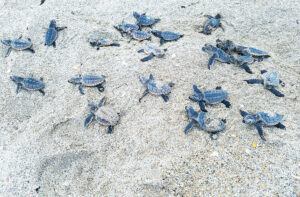Life Media’s own “Theo,” Emerald Coast Turtle Watch and the Florida Fish and Wildlife Conservation Commission (FWC) remind locals and visitors they can help protect nesting sea turtles by practicing some simple tips.
 Each year, thousands of sea turtles nest on Florida’s beaches. Florida beaches are the No. 1 place for sea turtle nests in North America from May to October. Northwest Florida beaches attract many endangered species including Green, Loggerhead, Leatherback and Kemps Ridley. A female will return to the beach where she was born to lay her eggs. “If you’re lucky enough to see it, it’s incredible to watch a 300-400 lb. Loggerhead sea turtle crawl up the beach which is no easy task, dig an 18-20-inch hole with only her back flippers, deposit her eggs, and then cover them back up with sand and pat it all down (all with only her back flippers),” says Sara Gray of Emerald Coast Turtle Watch. The whole process takes 30 to 60 minutes.
Each year, thousands of sea turtles nest on Florida’s beaches. Florida beaches are the No. 1 place for sea turtle nests in North America from May to October. Northwest Florida beaches attract many endangered species including Green, Loggerhead, Leatherback and Kemps Ridley. A female will return to the beach where she was born to lay her eggs. “If you’re lucky enough to see it, it’s incredible to watch a 300-400 lb. Loggerhead sea turtle crawl up the beach which is no easy task, dig an 18-20-inch hole with only her back flippers, deposit her eggs, and then cover them back up with sand and pat it all down (all with only her back flippers),” says Sara Gray of Emerald Coast Turtle Watch. The whole process takes 30 to 60 minutes.
There are many hazards and further complications if a sea turtle hatches during the daytime. For example, a sea gulls’ favorite snack is a baby sea turtle. The nest, also, is at risk of predation by animals as well as of high tides during storms, which can wash out and drown nests. Once hatched, they must make it to the water without becoming disoriented by artificial light or killed by predators. Finally, they arrive to their home in the Gulf where they are at risk of sharks, fish, fishing lines, ingesting debris and trash, boats and pollution. For the females who survive and return to shore to nest, it is a great victory. By the way, once she lays her eggs on the beach, the sea turtle mama never returns.
Because our state is so important to these special animals, beachgoers can help keep our beaches clean and dark, so sea turtles nest successfully. Everyone benefits from clean beaches and, since most of Florida’s sea turtles nest at night, it is important to keep our beaches dark because bright lights can disorient nesting turtles.
Stash the trash! Obstacles on the beach can prevent sea turtles from nesting as they crawl from the water, across the sand, to lay their eggs. They can also prevent sea turtle hatchlings from reaching the water once they emerge from their nests. Beachgoers can help sea turtles by properly disposing of all trash, filling in holes in the sand and putting away boats, beach toys and furniture. Fishing line can be deadly to sea turtles and other wildlife, so be sure to dispose of it properly. To find a monofilament recycling station near you, visit mrrp.myfwc.com.
Lights out! Bright lighting can misdirect and disturb nesting sea turtles and their hatchlings, leading them away from the ocean and toward potential danger. So, beachgoers should avoid using flashlights or cellphones on the beach at night. Anyone living along or visiting Florida beaches can do their part by turning out lights or closing curtains after dark to ensure nesting turtles are not disturbed as they come ashore and hatchlings will not become disoriented when they emerge from their nests. If lighting could still be visible from the beach, be sure it is long, low and shielded. And use turtle safe flashlights or flashlight covers when on the beach at night.
Fill in any holes you dig and smooth out sandcastles when you leave the beach each day.
“As beachgoers, we can all do our part to help sea turtles survive,” said Dr. Robbin Trindell, who heads the FWC’s sea turtle management program. “By keeping beaches dark and clearing the way at the end of the day, we can help ensure that these amazing animals keep returning to our beautiful state.”
What’s the most important thing to remember if you see a mama sea turtle on the beach? Sara says, “Be respectful, stay quiet and stay back at least 50 feet. Don’t get excited or be loud or take pictures with the flash on your cell phone which disorient the turtles and stress them out. They return to the water unable to lay their eggs.”
To learn more about sea turtles or to attend a class and see a nest, fill out an application at Emeraldcoastfl.com. Click on Explore, Ecotourism and then Beach Walks or visit the Facebook page.
Other ways to help sea turtles include reporting those that are sick, injured, entangled or dead to Emerald Coast Turtle Watch at (850) 865-0868 or the FWC’s Wildlife Alert Hotline at 888-404-FWCC (3922).
Locals can also purchase a “Helping Sea Turtles Survive” Florida license plate at myfwc.com which contributes to sea turtle research, rescue and conservation efforts. Or donate $5 and receive an FWC sea turtle decal.




























































